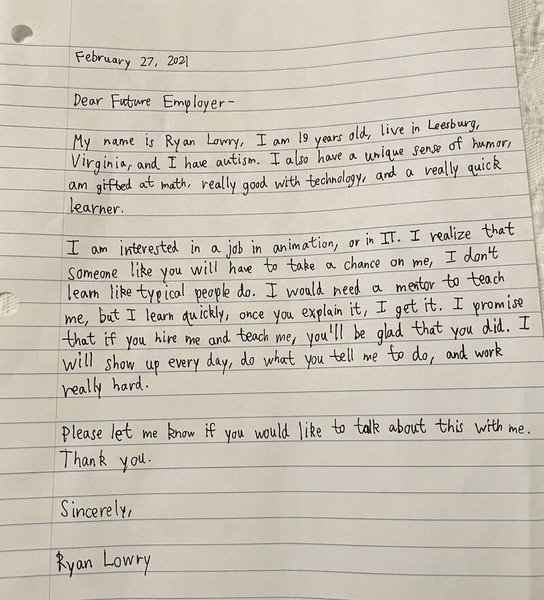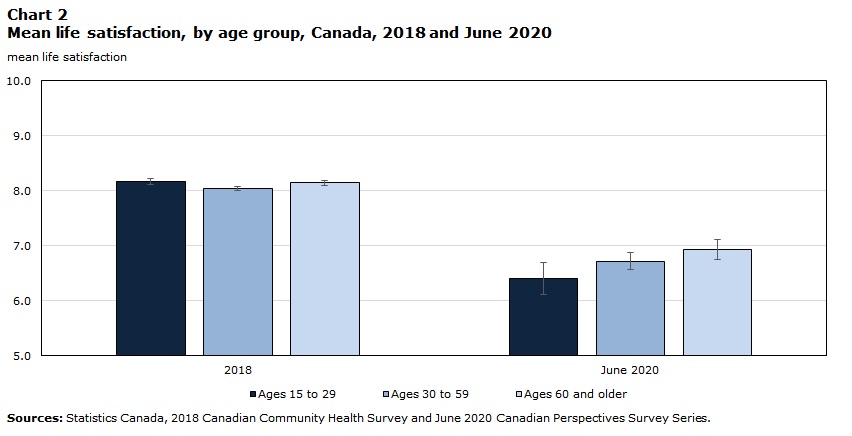Uncategorized
Young man’s social media employment success story highlights hiring barriers facing youth with disabilities

Article by Bronwyn Oatley
Earlier this month, a young autistic man’s employment letter went viral on LinkedIn, gaining over 180,000 likes and prompting job queries from popular animation studios and a specialized training program for people with disabilities.
And while Ryan Lowry, the 20-year-old author of the letter, was overjoyed with the success, some advocates are raising concern that youth with disabilities need to resort to such public and dramatic tactics to get a job.

“It is incredibly tragic and also a bit unsurprising that this happened,” said Courtney Ayukawa, manager of inclusive employment with the United Way of Greater Toronto, a funder of social enterprises that employ youth with disabilities. “It shows the state of employment––or lack of––for people with disabilities as a whole, but especially during and probably post-COVID.”
In Canada, just 15 per cent of youth with intellectual disabilities, including autism, are employed. And nearly three quarters of adults with intellectual disabilities who live independently or with friends rely on social assistance, according to a report by the Canadian Association for Community Living.
The challenges are similar for American youth, like Lowry, who are looking for work.
In his open letter, Lowry asked employers to “take a chance” on him. “I don’t learn like typical people do,” he wrote. “I would need a mentor to teach me, but I learn quickly, once you explain it, I get it.”
According to Ayukawa, Lowry’s post highlights one of the main challenges facing youth with disabilities: social stigma.
“I’ve heard many stories of an employer saying something like, ‘Well, one time I tried hiring someone with a disability and it didn’t work out’,” she said, underscoring that employers often take a ‘one shot’ approach to hiring a vast array of people.
This response, she says, is rooted in a lack of knowledge about the varied capacities and required accommodations for people with disabilities––and based on a misunderstanding of the basic fact a single person with a disability cannot be used as a proxy for all others.
This summer, Lowry will attend Exceptional Minds, a non-profit training program that prepares youth on the autism spectrum for animation and digital arts careers, according to Variety.
In parallel, tens of thousands of other young Americans and Canadians with intellectual disabilities will remain unemployed, despite their capacity and passion to work.
Uncategorized
Widespread protests in Burma as military stages coup; declares state of emergency

Widespread protests have engulfed Burma, also known as Myanmar, after its military ousted the country’s democratically elected government, and declared a year-long state of emergency.
The coup was staged as a new session of parliament was set to open on February 2, 2021.

Back in November of last year, Aung San Suu Kyi’s National League for Democracy (NLD) party had won a landslide victory in the general election.
The election was viewed as a referendum on the fledgling democratic government led by Ms. Suu Kyi and her NLD party, which won a landslide in 2015.
But the military had backed the opposition party, who were demanding a rerun of the election, claiming widespread fraud.
The election commission, however, has said there is no evidence to support these claims.
Chad Rogers, an analyst from Canadian public affairs agency Crestview Strategy, described Burma as being “a victim of a junta.”

“The democratic uprising from the people of Burman have risked their safety and security for are chipping away at the power of a totalitarian military regime,” he said in an interview.
Ms. Suu Kyi is now under house arrest and many other National League for Democracy officials have also been detained.
Asia-based freelance journalist and Burma expert Larry Jagan says this is part of the military strategy.
“There is little doubt that the game plan is to try and silence Aung San Suu Kyi, to prevent her having a political future in the country and to prevent her having any influence on future elections,” he said.
Power has been handed over to the military’s commander-in-chief, Min Aung Hlaing.
He has long wielded significant political influence, successfully maintaining the power of Burma’s military – even as the country moved towards democracy.

In his first public comments after the coup, Gen Hlaing sought to justify the takeover.
He said the military was on the side of the people and would form a “true and disciplined democracy.”
The military says it will hold a “free and fair” election once the state of emergency is over.
Uncategorized
Canadian Retailers Score an ‘F’ in Toxic Chemicals Report

By: Andrew Oliphant
A report card ranking retailers on toxic chemicals gave five Canadian brands a failing grade for their lack of commitment to reducing toxic chemicals in their supply chain. The report card, Who’s Minding the Store? is in its fifth year, and grades large retailers in Canada and the United States on their progress in reducing and eliminating toxic chemicals in their products and packaging.
Of the 50 retailers graded, a total of 15 brands received failing grades. Metro Inc., Sobeys, Couche-Tard, Circle K and Tim Hortons were the five Canadian retailers that received an “F” in the report. Some of the criteria include policy, accountability and chemical footprint.

The report targets retailers who use different toxic chemicals, particularly those that use per- and polyfluoroalkyl substances (PFAs). According to the EPA, PFAs can persist in the environment and in the human body, as they don’t break down over time. These chemicals can lead to adverse health effects to humans. The report recommends that all five brands “make progress by developing a public written safer chemicals policy.”
All five Canadian retailers were also recommended to “become a signatory to the Chemical Footprint Project.” The project looks to measure and disclose data on chemical use to reduce high-danger chemicals. The report states that increased transparency for all failing retailers would help improve grades in future report cards.

Metro Inc. scored last out all 50 reported retailers, scoring zero out of a possible 164 points in the 13 criteria that was measured. CTVNews.ca received a statement from Metro communications manager Stephanie Bonk, saying that the company was unaware of the report but they will “look into it.”
There are more than 200,000 stores across the two countries that are owned and operated by the 50 graded retailers in the report. These retailers play a large role in sustainability and in preventing toxic pollution of communities, workers, and the environment.
The report states that the report card “continues to show that grading retailers against one another motivates them to improve chemical safety.” Nearly 70 per cent of retailers that were graded in the previous report card saw improvement in their scores.
What can you do to reduce toxic chemicals in your products?
Though some decisions are up to retailers, there are also many simple ways that everyday Canadians can reduce their exposure to toxic chemicals.

Uncategorized
Canada slips in World Happiness ranking during COVID-19 pandemic

March 30, 2021 | By Jenna Benchetrit
Canada has ranked 15th in the 2021 World Happiness Report, falling out of the top ten during a year in which it has been ravaged by the COVID-19 pandemic.
Finland ranked number one for the fourth year in a row, with high representation of Nordic social democracies elsewhere in the top ten, according to Global News. Overall, the pandemic led to a decrease in well-being worldwide.
Canada’s happiness ranking has been dropping steadily in recent years. In 2020, it placed 10th worldwide, compared to 9th in 2019 and 7th in 2018 and 2017.
The report is published annually by the United Nations. It uses data from countries around the world to gage the happiness of their citizens, based on factors like trust in government, income levels and social services. The 2021 list is missing data from countries where COVID-19 made polling difficult.
“The World Happiness Report comes out this year after a global experiment that altered the life conditions of many, brought on by the COVID-19 pandemic,” said Christopher Barrington-Leigh, an associate professor at McGill University’s Institute for Health and Social Policy and Bieler School of Environment.
“In Canada, it is also a year in which significant efforts towards [well-being] measurement and policy-making are afoot in Nova Scotia and in Ottawa,” Barrington-Leigh added. Nova Scotia Premier Iain Rankin recently said that well-being and quality of life should be used as measures of progress in the province.
The new ranking reflects a 2020 survey from Statistics Canada, which found that the life satisfaction of Canadians had dropped 1.31 points between 2018 and 2020. The purpose of that survey was to evaluate the impacts of COVID-19 on Canadian well-being.
Teens were found to be especially vulnerable as a result of the pandemic, the report said. A study of roughly 1,000 Canadian adolescents predicted lower loneliness among those who spent more time with family and friends and engaged in physical activity. Another study of Canadian teens aged 18 and 19 found that “parasocial activities” like volunteering led to higher satisfaction in the days following those engagements.

While COVID-19 has led to a global short-term dip in quality of life, it has not posed the same disruption in long-term evaluations of happiness, the report’s co-author and Columbia University economist Jeffrey Sachs told the Associated Press.
-

 Canada5 years ago
Canada5 years agoSkyrocketing real estate prices spill over to suburban areas and small cities
-
Uncategorized5 years ago
Hello world!
-

 COVID-195 years ago
COVID-195 years agoSoundscapes Records Closing Permanently
-

 Entertainment5 years ago
Entertainment5 years agoWarner Bros. ‘Godzilla vs. Kong’ renews confidence in film industry with box office revenue
-

 Entertainment5 years ago
Entertainment5 years agoEllen DeGeneres loses over 1 million viewers following an apology over toxic workplace allegations
-

 Entertainment5 years ago
Entertainment5 years agoLil Nas X breaks the internet with new music video
-

 International5 years ago
International5 years agoCorruption Convictions Annulled Against Brazil’s Ex-President
-

 International5 years ago
International5 years agoThe fallout from Harry and Meghan’s bombshell interview with Oprah Winfrey
